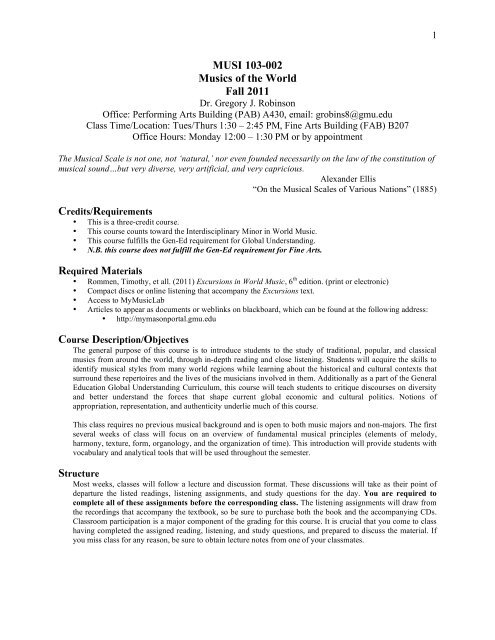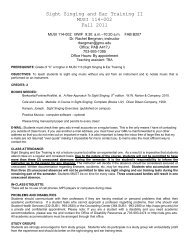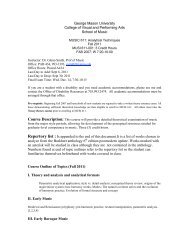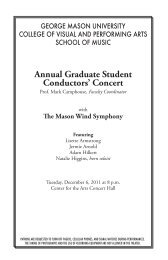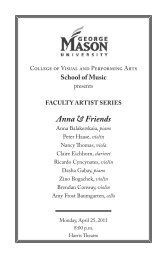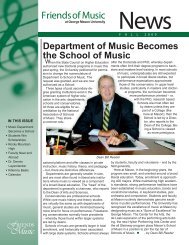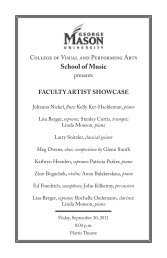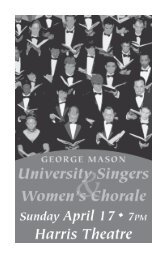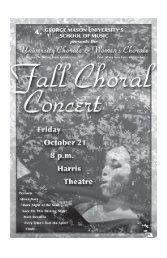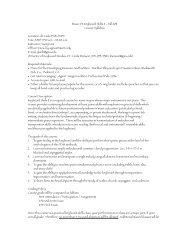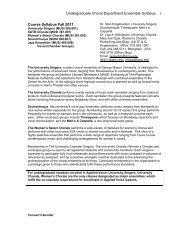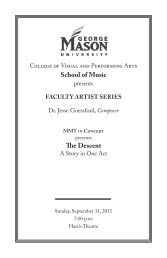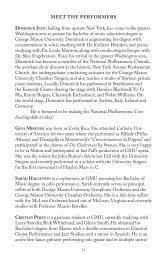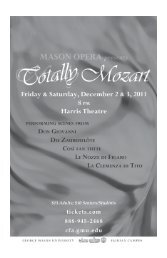103-002 Robinson Fall 2011 - George Mason University School of ...
103-002 Robinson Fall 2011 - George Mason University School of ...
103-002 Robinson Fall 2011 - George Mason University School of ...
You also want an ePaper? Increase the reach of your titles
YUMPU automatically turns print PDFs into web optimized ePapers that Google loves.
MUSI <strong>103</strong>-<strong>002</strong><br />
Musics <strong>of</strong> the World<br />
<strong>Fall</strong> <strong>2011</strong><br />
Dr. Gregory J. <strong>Robinson</strong><br />
Office: Performing Arts Building (PAB) A430, email: grobins8@gmu.edu<br />
Class Time/Location: Tues/Thurs 1:30 – 2:45 PM, Fine Arts Building (FAB) B207<br />
Office Hours: Monday 12:00 – 1:30 PM or by appointment<br />
The Musical Scale is not one, not ‘natural,’ nor even founded necessarily on the law <strong>of</strong> the constitution <strong>of</strong><br />
musical sound…but very diverse, very artificial, and very capricious.<br />
Alexander Ellis<br />
“On the Musical Scales <strong>of</strong> Various Nations” (1885)<br />
Credits/Requirements<br />
• This is a three-credit course.<br />
• This course counts toward the Interdisciplinary Minor in World Music.<br />
• This course fulfills the Gen-Ed requirement for Global Understanding.<br />
• N.B. this course does not fulfill the Gen-Ed requirement for Fine Arts.<br />
Required Materials<br />
• Rommen, Timothy, et all. (<strong>2011</strong>) Excursions in World Music, 6 th edition. (print or electronic)<br />
• Compact discs or online listening that accompany the Excursions text.<br />
• Access to MyMusicLab<br />
• Articles to appear as documents or weblinks on blackboard, which can be found at the following address:<br />
• http://mymasonportal.gmu.edu<br />
Course Description/Objectives<br />
The general purpose <strong>of</strong> this course is to introduce students to the study <strong>of</strong> traditional, popular, and classical<br />
musics from around the world, through in-depth reading and close listening. Students will acquire the skills to<br />
identify musical styles from many world regions while learning about the historical and cultural contexts that<br />
surround these repertoires and the lives <strong>of</strong> the musicians involved in them. Additionally as a part <strong>of</strong> the General<br />
Education Global Understanding Curriculum, this course will teach students to critique discourses on diversity<br />
and better understand the forces that shape current global economic and cultural politics. Notions <strong>of</strong><br />
appropriation, representation, and authenticity underlie much <strong>of</strong> this course.<br />
This class requires no previous musical background and is open to both music majors and non-majors. The first<br />
several weeks <strong>of</strong> class will focus on an overview <strong>of</strong> fundamental musical principles (elements <strong>of</strong> melody,<br />
harmony, texture, form, organology, and the organization <strong>of</strong> time). This introduction will provide students with<br />
vocabulary and analytical tools that will be used throughout the semester.<br />
Structure<br />
Most weeks, classes will follow a lecture and discussion format. These discussions will take as their point <strong>of</strong><br />
departure the listed readings, listening assignments, and study questions for the day. You are required to<br />
complete all <strong>of</strong> these assignments before the corresponding class. The listening assignments will draw from<br />
the recordings that accompany the textbook, so be sure to purchase both the book and the accompanying CDs.<br />
Classroom participation is a major component <strong>of</strong> the grading for this course. It is crucial that you come to class<br />
having completed the assigned reading, listening, and study questions, and prepared to discuss the material. If<br />
you miss class for any reason, be sure to obtain lecture notes from one <strong>of</strong> your classmates.<br />
1
2<br />
Assignments<br />
To access assignments on Blackboard:<br />
• On an approved browser, go to the webpage: http://mymasonportal.gmu.edu<br />
• Log in using your <strong>Mason</strong> ID and password<br />
• Click on the “Courses” tab on the top right hand side <strong>of</strong> the page<br />
• Click on MUSI <strong>103</strong>-<strong>002</strong> from the list <strong>of</strong> courses in the center column<br />
• Click on “Course Content” in the right column<br />
• Click on the folder for the appropriate day<br />
Reading: All <strong>of</strong> the assigned course readings will be found either in our course textbook, Excursions in World<br />
Music (available at the university bookstore or online), or on Blackboard. On our course’s Blackboard site, the<br />
“Course Content” page is organized into folders by date. Inside the folders, you will find the daily study<br />
questions. Also, in cases where the assigned readings come from sources other than our text, they can be found<br />
in the Course Content folders in pdf form or as weblinks. Please bring the assigned reading into class every<br />
day, whether it be the textbook, a printed copy <strong>of</strong> a pdf file, or your computer with the pdf saved, as we will<br />
frequently refer to these readings during class.<br />
Listening: All assigned listening will be available on the CDs that accompany the course textbook, or on the<br />
MyMusicLab page online.<br />
Study Questions: Students will be required to answer several short study questions in preparation for each<br />
class. These questions will be located on Blackboard, in the appropriate folder on the “Course Content” page.<br />
These questions will help you to identify the key points <strong>of</strong> each reading and organize your thoughts for in-class<br />
discussion. Please answer all questions in complete sentences. In most cases, answers will not need to be more<br />
than one sentence in length. Please answer all questions within the space provided rather than attaching<br />
documents with your answers.<br />
Due Dates for Study Questions:<br />
• All study questions are due by the beginning o our class period on the due date.<br />
• Students may submit late study question responses for partial credit under the following conditions:<br />
o The late submission box for each study question assignment on blackboard will close two<br />
weeks after the original due date.<br />
o Each student may submit up to three study questions assignments late without penalty.<br />
o After the third late assignment, each late submission will be counted for half credit.<br />
Exams<br />
Three exams will be given throughout the semester, covering material from the reading, listening, and lectures.<br />
Though exams generally cover only the material from the immediately preceding portion <strong>of</strong> the course, sections<br />
<strong>of</strong> the last two exams may be cumulative. If you know you must miss an exam, please contact me within the<br />
first two weeks <strong>of</strong> class. Medical exceptions may be made with advanced notice and sufficient documentation<br />
from a doctor. If you miss an exam and are permitted to make it up, it is your responsibility to make sure you<br />
schedule a make-up time. All excused missed exams must be made up within two weeks <strong>of</strong> the original exam<br />
date.<br />
Attendance<br />
A student can have up to two unexcused absences over the course <strong>of</strong> the semester and still receive full credit for<br />
his or her attendance. After that point, a third <strong>of</strong> a letter grade will be subtracted from the final attendance grade<br />
for each absence (0-2 absences = A+, 3 absences = A, 4 absences = A-, etc.). If you need to miss class for any<br />
reason, please contact me ahead <strong>of</strong> time and provide the appropriate documentation. Consistent participation in<br />
class discussions can improve an attendance/participation grade. Consistent disruptions can result in points<br />
subtracted from the final attendance/participation grade. If lateness becomes a problem, I will start counting late<br />
arrivals as half-absences.
Concert Reports<br />
Each student is required to attend three (3) live musical performances during the current semester. Each<br />
report will entail three parts.<br />
1. Attend a musical event, paying attention to the kinds <strong>of</strong> considerations we discuss in class. These<br />
musical events may be concerts, dance performances, religious services, political rallies, etc.<br />
• The events you attend MUST FEATURE LIVE MUSICAL PERFORMANCE. If you<br />
have any confusion or questions about whether an event fits this requirement, please ask<br />
me.<br />
• Each <strong>of</strong> the events you attend must feature a distinctly different musical tradition or style,<br />
or reflect a different region <strong>of</strong> the world. Again, please ask me if you have any questions<br />
about whether two specific concerts are different enough.<br />
2. Once you have attended an event you will be required to prepare a report on some aspect <strong>of</strong> the<br />
performance and post it on the discussion board on this course’s Blackboard site. Reports should<br />
be approximately three hundred (300) words in length and should use the vocabulary and ideas<br />
discussed in class. As the semester progresses and as the number <strong>of</strong> reports increases, students<br />
may craft their reports in such a way as to respond to other students’ posts, but it is not necessary<br />
to do so.<br />
• Once we have covered musical fundamentals, I will explain the concert report guidelines<br />
in greater depth.<br />
3. Additionally, you will be required to submit to me in class some form <strong>of</strong> pro<strong>of</strong> that you attended<br />
the musical event. This could take the form <strong>of</strong> a ticket stub, a program, or a photo <strong>of</strong> yourself in<br />
front <strong>of</strong> the stage at the performance (as permitted by the host organization).<br />
• Make sure that your name as well as the course number and section number for this class<br />
appears on your pro<strong>of</strong> <strong>of</strong> attendance.<br />
• Once you have posted your report online, print out a copy and submit it to me in class,<br />
attached (stapled/paperclipped) to your pro<strong>of</strong> <strong>of</strong> attendance.<br />
• Due dates:<br />
o Concert reports must be posted and turned in no more than two weeks after the date <strong>of</strong> the event.<br />
o These assignments have a rolling deadline as concert opportunities and individual students’<br />
schedules vary, but some basic principles apply:<br />
Two reports will be due no later than 10/20<br />
The final report will be due no later than 12/1<br />
You may complete the reports before but not after the deadlines.<br />
o N.B. The deadlines refer to in-class submission. You must have submitted your pro<strong>of</strong> <strong>of</strong><br />
attendance to me by the beginning <strong>of</strong> our class period on the due date, which means you<br />
must have posted to the discussion board before the due date.<br />
• Up to three extra concert reports may be completed for extra credit.<br />
• These assignments will not be graded on a letter system. Rather, students will receive checks if they have<br />
completed the assignment in a satisfactory manner. If a report falls short <strong>of</strong> the parameters set out in the<br />
guidelines, the report will not receive full credit. For the first two reports, if a student submits an<br />
assignment that does not receive full credit, he or she will have the opportunity to correct and re-submit the<br />
assignment for late credit. For the last report, this opportunity will not be available.<br />
Grading<br />
The final grade in this course will depend on several components—attendance and class participation<br />
(preparation for and participation in classroom discussions), study questions, concert reports, and three exams.<br />
Each <strong>of</strong> these components will be weighted in the following way:<br />
Attendance/Participation 10%<br />
Study Questions 10%<br />
Concert Reports 20%<br />
Exam 1 20%<br />
Exam 2 20%<br />
Exam 3 20%<br />
3
4<br />
Class and <strong>University</strong> Policies:<br />
Cellular Phones, Blackberries, iPhones, iPods, etc: All electronic communication devices must be turned <strong>of</strong>f at<br />
the beginning <strong>of</strong> class and remain <strong>of</strong>f for the duration <strong>of</strong> the class.<br />
Email:<br />
1. All <strong>of</strong>ficial electronic communications with pr<strong>of</strong>essors must be undertaken through a GMU email account.<br />
All class announcements will come through this server and students are responsible to stay current with<br />
their GMU accounts.<br />
2. Please include your course and section number in the subject heading <strong>of</strong> all emails you send to me.<br />
Honor Code: GMU is an Honor Code university; please see the <strong>University</strong> Catalog for a full description <strong>of</strong> the code<br />
and the honor committee process. The principle <strong>of</strong> academic integrity is taken very seriously and violations are<br />
treated gravely. Essentially, this means that when you are responsible for a task, you will perform that task. When<br />
you rely on someone else’s work in an aspect <strong>of</strong> the performance <strong>of</strong> that task, you will give full credit in the proper,<br />
accepted form. Another aspect <strong>of</strong> academic integrity is the free play <strong>of</strong> ideas. Vigorous discussion and debate are<br />
encouraged in this course, with the firm expectation that all aspects <strong>of</strong> the class will be conducted with civility and<br />
respect for differing ideas, perspectives, and traditions. When in doubt (<strong>of</strong> any kind) please ask for guidance and<br />
clarification.<br />
Please read carefully the following information, taken from the university website, found at<br />
http://mason.gmu.edu/~montecin/plagiarism.htm#plagiarism:<br />
Plagiarism encompasses the following:<br />
1. Presenting as one's own the words, the work, or the opinions <strong>of</strong> someone else without proper<br />
acknowledgment.<br />
2. Borrowing the sequence <strong>of</strong> ideas, the arrangement <strong>of</strong> material, or the pattern <strong>of</strong> thought <strong>of</strong><br />
someone else without proper acknowledgment. 1<br />
Plagiarism Statement<br />
Plagiarism means using the exact words, opinions, or factual information from another person without<br />
giving that person credit. Writers give credit through accepted documentation styles, such as parenthetical<br />
citation, footnotes, or endnotes; a simple listing <strong>of</strong> books and articles is not sufficient. Plagiarism is the<br />
equivalent <strong>of</strong> intellectual robbery and cannot be tolerated in an academic setting. Student writers are <strong>of</strong>ten<br />
confused as to what should be cited. Some think that only direct quotations need to be credited. While<br />
direct quotations do need citations, so do paraphrases and summaries <strong>of</strong> opinions or factual information<br />
formerly unknown to the writers or which the writers did not discover themselves. Exceptions for this<br />
include factual information which can be obtained from a variety <strong>of</strong> sources, the writers' own insights or<br />
findings from their own field research, and what has been termed common knowledge. What constitutes<br />
common knowledge can sometimes be precarious; what is common knowledge for one audience may not<br />
be so for another. In such situations, it is helpful, to keep the reader in mind and to think <strong>of</strong> citations as<br />
being "reader friendly." In other words, writers provide a citation for any piece <strong>of</strong> information that they<br />
think their readers might want to investigate further. Not only is this attitude considerate <strong>of</strong> readers, it will<br />
almost certainly ensure that writers will never be guilty <strong>of</strong> plagiarism (statement <strong>of</strong> English Department at<br />
<strong>George</strong> <strong>Mason</strong> <strong>University</strong>). 2<br />
1 <strong>George</strong> <strong>Mason</strong> <strong>University</strong>, “<strong>George</strong> <strong>Mason</strong> <strong>University</strong> Honor System and Code” <strong>George</strong> <strong>Mason</strong> <strong>University</strong>,<br />
http://mason.gmu.edu/~montecin/plagiarism.htm#plagiarism.<br />
2 Ibid.
For guidelines on proper citation, see The Chicago Manual <strong>of</strong> Style or the Modern Languages<br />
Association’s guide to formatting and style.<br />
Office <strong>of</strong> Disability Services: If you are a student with a disability and you need academic accommodations, please<br />
see me and contact the Office <strong>of</strong> Disability Services (ODS) at 993-2474. All academic accommodations must be<br />
arranged through the ODS. http://ods.gmu.edu<br />
Other Useful Campus Resources:<br />
• Writing Center: A114 <strong>Robinson</strong> Hall; (703) 993-1200; http://writingcenter.gmu.edu<br />
• <strong>University</strong> Libraries “Ask a Librarian”: http://library.gmu.edu/mudge/IM/IMRef.html<br />
• Counseling and Psychological Services (CAPS): (703) 993-2380; http://caps.gmu.edu<br />
• <strong>University</strong> Catalog: The <strong>University</strong> Catalog, http://catalog.gmu.edu, is the central resource for university<br />
policies affecting student, faculty, and staff conduct in university academic affairs. Other policies are<br />
available at http://universitypolicy.gmu.edu/. All members <strong>of</strong> the university community are responsible for<br />
knowing and following established policies.<br />
General Education Learning Outcomes for Global Understanding<br />
A general education course in Global Understanding should address at least three <strong>of</strong> the following learning<br />
outcomes. Upon completing the course, students will be able to:<br />
• Develop understanding <strong>of</strong> global patterns and processes and their potential impact on society<br />
• Demonstrate understanding <strong>of</strong> the interconnectedness, difference, and diversity <strong>of</strong> a global society<br />
• Identify, evaluate and properly cite resources appropriate to the field, such as audio/visual/online/print<br />
materials, or artifacts<br />
• Apply awareness <strong>of</strong> global issues to a consideration <strong>of</strong> individual responsibilities within a global society<br />
• Devise analytical, practical, or creative responses to global problems or issues<br />
Week 1<br />
Week 2<br />
Week 3<br />
Week 4<br />
Week 5<br />
MUSI <strong>103</strong>-<strong>002</strong> <strong>Fall</strong> <strong>2011</strong> Schedule <strong>of</strong> Classes and Assignments (subject to revision)<br />
8/30 Introduction, Syllabus<br />
9/1 Christopher Small: “Prelude” (blackboard)<br />
9/6 Last day to add classes Excursions Chapter 1 (Introduction)<br />
9/8 Lecture on Musical Fundamentals (No reading assignment or study questions)<br />
9/13 Excursions Chapter 2 (India) Part I (pp. 26-40)<br />
9/15 Excursions Chapter 2 Part II (pp. 40-53)<br />
9/19 Last day to drop classes with a 33% tuition penalty<br />
9/20 Excursions Chapter 7 (Sub-Saharan Africa) Part I (pp. 190-215)<br />
9/22 Excursions Chapter 7 Part II (pp. 216-225)<br />
9/27 REVIEW FOR EXAM 1<br />
9/29 EXAM 1<br />
9/30 (Friday): Final drop deadline (67% tuition penalty)<br />
5
6<br />
Week 6<br />
Week 7<br />
Week 8<br />
Week 9<br />
10/4 Excursions Chapter 6 (Indonesia) Part I (pp. 162- 177 top <strong>of</strong> page)<br />
10/6 Excursions Chapter 6 (Indonesia) Part II (pp. 177-193)<br />
10/11 No Class (Monday classes meet)<br />
10/13 Excursions Chapter 3 (Middle East) Part I (pp. 54-73)<br />
10/18 Excursions Chapter 3 Part II (73-87)<br />
10/20 First Two Concert Reports Due Reading TBA<br />
10/25 Excursions Chapter 10 (Caribbean) Part I (please read all)<br />
10/27 Excursions Chapter 10 Part II<br />
Week 10<br />
11/1 Feld: The Poetics and Politics <strong>of</strong> Pygmy Pop (blackboard)<br />
11/3 REVIEW FOR EXAM 2<br />
Week 11<br />
11/8 EXAM 2<br />
11/10 Excursions Chapter 11 (Native North America)<br />
Week 12<br />
11/15 Claudia Gorbman: “Scoring the Indian” (blackboard)<br />
11/17 In-class film TBA<br />
Week 13<br />
11/22 Excursions Chapter 9 (Latin America)<br />
11/24 No class: Thanksgiving Break<br />
Week 14<br />
11/29 In-Class Samba Workshop<br />
12/1 Last Concert Report Due Charles A. Perrone: “Brazil” (blackboard)<br />
Week 15<br />
12/6 Charles A. Perrone: “Myth, Melopeia, and Mimesis” (blackboard)<br />
12/8 REVIEW FOR EXAM 3<br />
EXAM 3: Tuesday, December 13, 1:30 PM to 4:15 PM<br />
Complete References for Materials on Blackboard:<br />
Feld, Steven. “The Poetics and Politics <strong>of</strong> Pygmy Pop.” In Western Music and Its Others, edited by Georgina Born<br />
and David Hesmondhaugh, 254-279. Berkeley: <strong>University</strong> <strong>of</strong> California Press, 2000.<br />
Gorbman, Claudia. “Scoring the Indian.” In Western Music and Its Others, edited by Georgina Born and David<br />
Hesmondhaugh, 234–253. Berkeley: <strong>University</strong> <strong>of</strong> California Press, 2000.<br />
Perrone, Charles A. “Brazil.” Popular Music 6, no. 2, (1987): 219–26.<br />
––––––––. “Myth, Melopeia, and Mimesis: Black Orpheus, Orfeu, and Internationalization in Brazilian Popular<br />
Music.” In Brazilian Popular Music and Globalization, edited by Charles A. Perrone and Christopher<br />
Dunn, 46-71. Gainesville: <strong>University</strong> Press <strong>of</strong> Florida, 2001.<br />
Small, Christopher. “Prelude: Music and Musicking.” Musicking: The Meanings <strong>of</strong> Performing and Listening, 1-18.<br />
Middletown, CT: Wesleyan <strong>University</strong> Press, 1998.
Faculty: Carroll, Lepore, Owens, <strong>Robinson</strong> (coordinator)<br />
Interdisciplinary Minor in World Music<br />
Performing Arts Building, Room A417<br />
Phone: 703-993-1380; Web: music.gmu.edu<br />
Requirements: Students must complete 16 to 18 credits, with a 10-credit core and opportunities to take electives in<br />
several departments at <strong>Mason</strong>.<br />
Prerequisite: Students must first demonstrate to the World Music coordinator a basic level <strong>of</strong> knowledge and<br />
training in some area <strong>of</strong> Western or non-Western music, or earn a grade <strong>of</strong> B or higher in MUSI <strong>103</strong> or 431.<br />
Prerequisites for specific courses are indicated below.<br />
<strong>University</strong> policy states that students must earn 8 distinct credits that are not used for their major toward their minor.<br />
Course Work: This program is designed for those who wish to widen their scope <strong>of</strong> knowledge about music while<br />
deepening their understanding <strong>of</strong> the world’s peoples. Students learn in the classroom, as well as experientially, in<br />
the form <strong>of</strong> applied studies and exercises in field work how music making functions within cultural contexts,<br />
conveying varied meanings in bodily action and musical sound worldwide. Students gain skills that will serve them<br />
in many fields <strong>of</strong> endeavor, from developing specific musical expertise to acquiring pr<strong>of</strong>iciency with technological<br />
and anthropological aspects <strong>of</strong> ethnographic enquiry.<br />
Core (10 credits)<br />
• MUSI <strong>103</strong> - Musics <strong>of</strong> the World Credits: 3<br />
• ANTH 114 - Introduction to Cultural Anthropology Credits: 3<br />
• MUSI 497 - Independent Study Credits: 1-3<br />
• One <strong>of</strong> the following two courses (1 credits):<br />
o Applied Music (PMI)<br />
or<br />
o Ensembles (Selection <strong>of</strong> private music instruction or ensemble must be approved by minor<br />
coordinator.)<br />
Electives (6-8 credits)<br />
Electives must be approved by the minor coordinator and should be selected from the following:<br />
• Applied Music (PMI) (1-3)<br />
• MUSI 485 - Chamber Ensembles Credits: 1<br />
• MUSI 102 - Popular Music in America Credits: 3<br />
• MUSI 107 - The Development <strong>of</strong> Jazz Credits: 3<br />
• MUSI 379 - Introduction to Jazz Improvisation Credits: 1<br />
• DANC 118 - World Dance Credits: 3<br />
• DANC 119 - Dance in Popular Culture: Afro-Latino Dance Credits: 3<br />
• COMM 157 - Video Workshop Credits: 1<br />
• COMM 305 - Foundations <strong>of</strong> Intercultural Communication Credits: 3<br />
• ENGL 333 - Folklore and Folklife Credits: 3<br />
• AFAM 200 - Introduction to African American Studies Credits: 3<br />
• AFAM 390 - Special Topics in African and African American Studies Credits: 3<br />
• AVT 378 - The African American Experience in the Performing Arts Credits: 3<br />
• ANTH 302 - Peoples and Cultures <strong>of</strong> Latin America Credits: 3<br />
• ANTH 306 - Peoples and Cultures <strong>of</strong> Island Asia Credits: 3<br />
• ANTH 309 - Peoples and Cultures <strong>of</strong> India Credits: 3<br />
7


